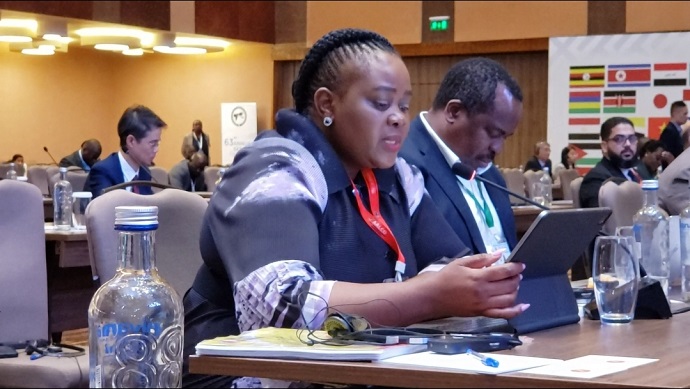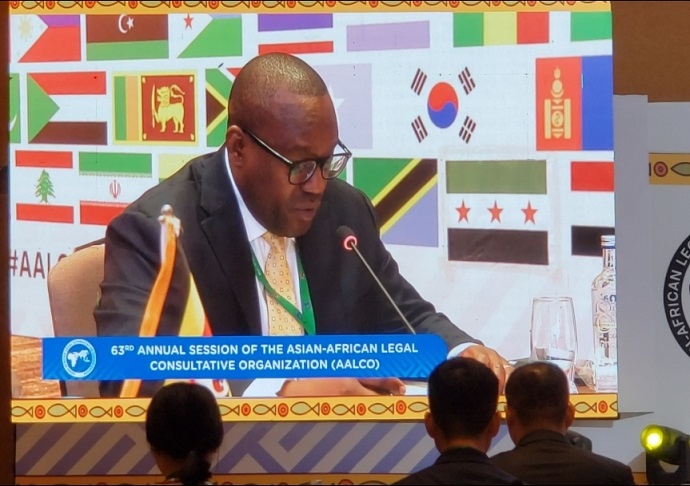By Chipo Brenda
Stakeholders from across Africa and Asia have underscored the urgent need for a legally binding framework to address the full life cycle of plastics, ensure accountability for trans-boundary pollution, and recognize the unique challenges faced by developing countries.
These key points emerged during the 63rd Annual Session of the Asian-African Legal Consultative Organization (AALCO), held at Speke Resort Munyonyo in Kampala, Uganda.
Climate Change Injustice: A Shared Responsibility
Speaking during the session, Uganda’s Attorney General Kiryowa Kiwanuka, who chaired the discussions, emphasized the shared responsibility of member states in tackling climate change. He highlighted the injustices inflicted on the environment, noting the relevance of revisiting international frameworks such as the United Nations Convention on the Law of the Sea (UNCLOS).
“Climate change is a global reality — it doesn’t distinguish between developed and developing countries. We must come together to find solutions,” Kiwanuka stated, before opening the floor to stakeholders.
Law of the Sea and Regional Integration
Rebecca Alitwala Kadaga, Uganda’s First Deputy Prime Minister and Minister for East African Affairs, reiterated the importance of UNCLOS as a longstanding topic within AALCO.“The Law of the Sea also applies to Lake Victoria — one of East Africa’s largest water bodies — and provides a platform for African and Asian voices in shaping ocean governance,” Minister Kadaga explained.
She added that Uganda is committed to implementing the 2021 regulations on inland water transport, aimed at controlling pollution and promoting safe waterway use.
South Africa Welcomes BBNJ Agreement

Mmamoloko Kubayi, South Africa’s Minister of Justice and Constitutional Development, welcomed the adoption of the BBNJ Agreement (Biodiversity Beyond National Jurisdiction), signed in June 2025. She described it as the third implementing agreement under UNCLOS.
“The Law of the Sea forms the legal foundation for the peaceful, equitable, and sustainable use of marine resources,” Minister Kubayi said. “It also provides the framework to address both traditional and emerging challenges — from biodiversity loss to climate change.”
She further emphasized the need for simplified, effective mechanisms for environmental compensation, funding, and recognition of socio-economic impacts and rehabilitation costs.
Call for Shared but Differentiated Responsibilities
Pius Perry Biribonwoha, Uganda’s Solicitor General, stressed the importance of states fulfilling their binding duties to prevent, reduce, and control environmental harm. He invoked the principle of common but differentiated responsibilities, rooted in the 1992 UN Framework Convention on Climate Change.

“Developed nations carry a greater burden, given their role in environmental degradation,” he said. “The global crisis — pollution, degradation, and climate change — threatens livelihoods, security, and the planet’s future. Regulating hazardous substances must be a top priority across Africa and Asia.”
International Support and Commitments
Delegates from Bahrain and Syria, including Dr. Mazhar Alwais, Bahrain’s Minister of Justice, and Hassan Alturba, Syria’s Attorney General, expressed their commitment to ensuring that regional and global activities are carried out for the benefit of all nations.
Fidelis Mwanandenje, a Senior Government Asset Management Officer, noted that scientific uncertainty around the impacts of pollution on fragile ecosystems calls for collaborative environmental action.
“The Law of the Sea reflects the idea that our oceans are a shared resource, meant to serve the common good. It is a vital tool for promoting Afro-Asian priorities, environmental protection, and global equity through the rule of law.”


